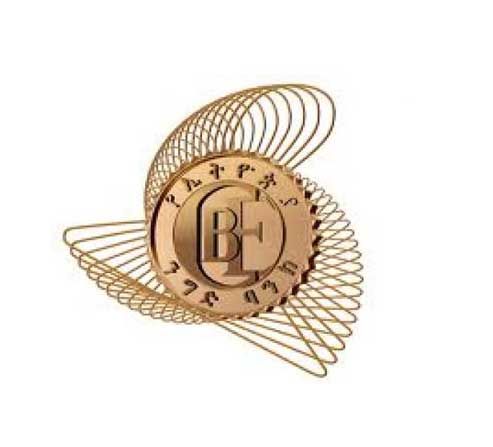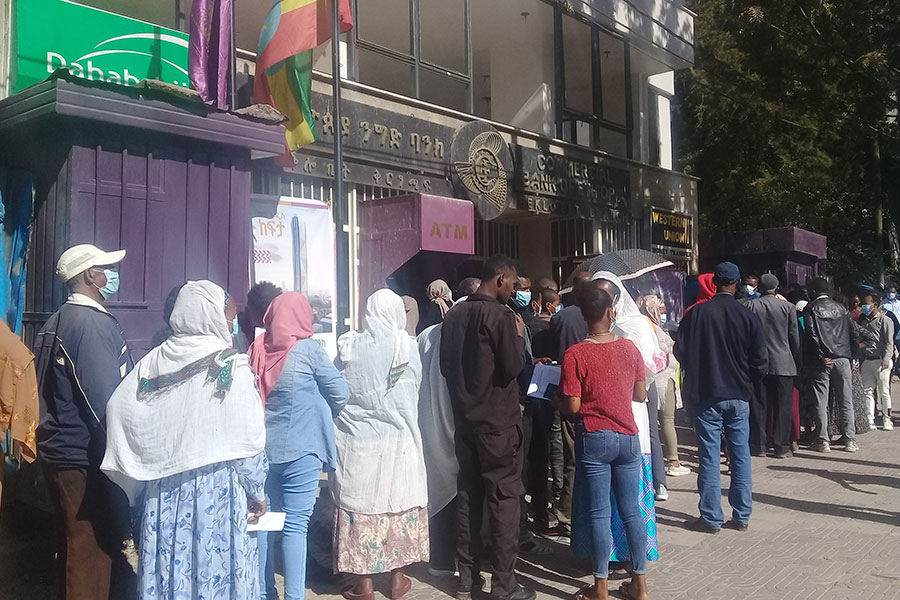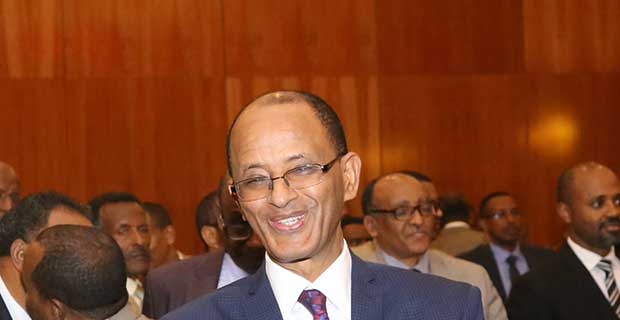
Directors of the the Commercial Bank of Ethiopia (CBE) have asked the Ministry of Finance to provide over 90 billion Br to address its credit demand, which has not been quenched by mobilised deposits.
The board of directors of the state-owned Bank, which holds a large sum of state-owned enterprise (SOE) debt, has made the request as a liquidity buffer to cover operational costs and disburse new loans. So far, the Bank has received 33 billion Br in two tranches in response to its application from the central bank and the Ministry of Finance.
However, the remaining amount of funding will not be attended to in this fiscal year, since it is not in a desperate situation, according to a senior executive from the Bank.
"We expect the remaining cash to be in next year's budget," the senior official told Fortune.
Out of the cash it received to date, 16 billion Br was provided as a liquidity pool from the central bank in the form of a bond with a maturity period of three years at an eight percent interest rate. In the last few months, the Bank's balance sheet has deteriorated due to poor asset quality as a result of considerable SOE debt exposure and the liquidity crunch.
The Bank hit rock bottom in its liquidity position in April 2019, at 9.3pc, followed by October and November of last year, with 10pc and 10.7pc, respectively. Its highest stance, at 16pc, was registered in October 2017. The average loan-to-deposit ratio the Bank has maintained over the past year is above 100pc.
With the fallout from the Novel Coronavirus (COVID-19) shaking the economy like never before, this injection will answer the increasing calls from borrowers to reschedule loan payments and balance weakening asset quality and intense liquidity pressure going forward, according to CBE executives.
The second liquidity injection of 17 billion Br came from the Ministry of Finance three weeks ago as a means of paying back a portion of SOE debt guaranteed by the Ministry. CBE has used seven billion Birr of the total value to clear out unpaid debts it owes other companies, while the rest was kept as a deposit for future commitments.
In redirecting the second liquidity injection to CBE, the Ministry of Finance borrowed the cash from the central bank, which is considered the lender of last resort in offering loans to institutions that are experiencing financial difficulties. The central bank raised the money through the sale of treasury bills.
CBE, which has outstanding loans from SOEs that equate to the last two years of the country's federal budget, is owed 400 billion Br by Ethiopian Electric Power, 120 billion Br by Ethiopian Railways Corporation, 70 billion Br by the Sugar Corporation, and an additional 70 billion Br by the Metals & Engineering Corporation (MetEC).
Its lending went to the construction of the Great Ethiopian Renaissance Dam (GERD), 10 sugar factories, Yayu Multi-Complex Industries and building the railways, among other projects.
A committee that was formed by the macroeconomic committee to map out scenarios of handling the accumulated debts of state-owned enterprises is also expected to table the second version of the recommendation in the middle of the week. Over the past two months, the committee has been devising strategies to reinforce the financial stability of Commercial Bank and other SOEs.
The committee, which is composed of members from the Ministry of Finance, the NBE and the Public Enterprises Holding & Administration Agency, is tabling a recommendation that primarily requires the government to absorb a portion of the debt. At the same time, the remaining debt will be settled based on negotiations between the SoEs and the Bank.
PUBLISHED ON
[ VOL
, NO
]

Radar | Jun 27,2020

Featured | Jun 15,2025

Fortune News | Feb 13,2021

Radar | Dec 29,2018

Radar | Mar 12,2022

Fortune News | Feb 03,2024

Advertorials | Oct 10,2019

Fortune News | Feb 15,2020

Radar | Oct 09,2021

Radar | Feb 29,2020

Dec 22 , 2024 . By TIZITA SHEWAFERAW
Charged with transforming colossal state-owned enterprises into modern and competitiv...

Aug 18 , 2024 . By AKSAH ITALO
Although predictable Yonas Zerihun's job in the ride-hailing service is not immune to...

Jul 28 , 2024 . By TIZITA SHEWAFERAW
Unhabitual, perhaps too many, Samuel Gebreyohannes, 38, used to occasionally enjoy a couple of beers at breakfast. However, he recently swit...

Jul 13 , 2024 . By AKSAH ITALO
Investors who rely on tractors, trucks, and field vehicles for commuting, transporting commodities, and f...

Oct 25 , 2025
The regulatory machinery is on overdrive. In only two years, no fewer than 35 new pro...

Oct 18 , 2025
The political establishment, notably the ruling party and its top brass, has become p...

Oct 11 , 2025
Ladislas Farago, a roving Associated Press (AP) correspondent, arrived in Ethiopia in...

Oct 4 , 2025
Eyob Tekalegn (PhD) had been in the Governor's chair for only weeks when, on Septembe...